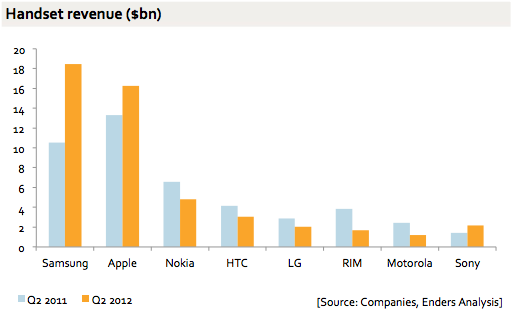The crunch among handset makers who are not Samsung and Apple continues apace. Today, Android OEM Sony announced that its loss-making mobile handset division Sony Mobile Communications would be laying out 15% of its workforce — 1,000 people approximately — as part of a bigger restructuring. It will also move its HQ and “certain other functions” from Lund, Sweden to Tokyo, Japan in October 2012.
It looks like the main impact will be in Sweden in terms of layoffs, as Sony moves the operation closer to home base: 650 in Lund, with the rest “primarily consultants in Sweden.” The process is due to complete by March 2014 “as the company seeks to increase operational efficiency, reduce costs and drive profitable growth.”
Sony Mobile also notes that its Lund operation is not closing down altogether: it will continue “to be an important strategic site for Sony Mobile, with the main focus on software and application development,” the company says. In addition to Lund and Tokyo the company also has operations in Beijing, China. As part of the restructuring, Sony Mobile says it will be “redefining” the roles of each site, although details of what that will mean where not revealed in the release.
Sony took full control of Sony Mobile from the JV with Ericsson in February 2012 to shore up control of the mobile division at a time when the business was losing a lot of steam to Samsung and other Android handset makers, as well as Apple in the overall smartphone space.
Sony has concentrated its smartphone effort into its Xperia brand of devices, but it’s not clear that it is able to wrest enough market share off of Samsung to convert this into a profitable business. At the end of last year, it was estimated that Sony’s Xperia phones made up 12% of all Android phones sold. At that time Samsung had a 41% share. Gartner notes however that in Q2 Samsung made up more than half of all Android devices sold, concentrating its lead.
At the same time Sony Mobile’s parent company is seeing difficult times. Earlier this month Sony Corporation posted a $312 million loss for its quarterly earnings.
In the statement issued announcing the news, Sony Mobile president Kunimasa Suzuki — who took over from Berg Nordberg earlier this year — attributes the restructuring to better align the company with the wider business. He says that the Xperia brand “continues to gain momentum” with consumers:
“Sony has identified the mobile business as one of its core businesses and the Xperia™ smartphone portfolio continues to gain momentum with customers and consumers worldwide,” said Kunimasa Suzuki, President and CEO of Sony Mobile. “We are accelerating the integration and convergence with the wider Sony group to continue enhancing our offerings, and a more focused and efficient operational structure will help to reduce Sony Mobile’s costs, enhance time to market efficiency and bring the business back to a place of strength.”
However, if the “momentum” is real, the last earnings show that this is not translating yet into profit. The unit in the last quarter posted a $356 million net loss. Part of that, Sony noted, was due to “the impact of the above-mentioned lower sales of PCs and the impact associated with the acquisition of Sony Mobile.”
At the same time sales increased 132.9% year-on-year to $3.6 billion. In fact, research from Enders Analysis shows that among the bigger handset makers, Sony Mobile was the only one, apart from Samsung and Apple (of course), who grew mobile revenues over last year.

Ericsson — and then Sony Ericsson — once enjoyed a position as one of the world’s biggest handset makers. They were also very early movers in the touchscreen smartphone space, with the P800 being one of the very first touchscreen Symbian devices, in 2002, to hit the market.
But like other companies from the Old Guard, Sony has been hit hard by competition from newer entrants. According Q2 handset sales figures from Gartner, Sony Mobile didn’t make rankings among the top mobile phone makers. That list was led by Samsung, with Nokia and Apple filling out the top three, flanked then by a number of newer Chinese handset makers. (Motorola, another old-timer that Google will now be trying to infuse with new life, is still just about in the list with a 2.2 percent share.)
Full release below.
Sony Mobile Communications Announces New Operational Structure and Reduction in Workforce
LONDON, UK – August 23, 2012 – Sony Mobile Communications AB (“Sony Mobile”) today announced that it is altering the global operational structure of its development sites in Tokyo, Japan, Lund, Sweden and Beijing, China. In October 2012, Sony Mobile will move its corporate headquarters and certain other functions from Lund, Sweden, to Tokyo, Japan. Sony Mobile has also redefined the roles and responsibilities of each major development site to leverage the strengths of each respective site. These measures aim to enhance operational and development capabilities of Sony Mobile such as time to market efficiency, streamline supply chain management and drive greater integration with the wider Sony group.
“Sony has identified the mobile business as one of its core businesses and the Xperia™ smartphone portfolio continues to gain momentum with customers and consumers worldwide,” said Kunimasa Suzuki, President and CEO of Sony Mobile. “We are accelerating the integration and convergence with the wider Sony group to continue enhancing our offerings, and a more focused and efficient operational structure will help to reduce Sony Mobile’s costs, enhance time to market efficiency and bring the business back to a place of strength.”
In relation to the operational structure changes, Sony Mobile plans to reduce its global headcount by approximately 15 percent (approximately 1000 personnel, including consultants) throughout the financial years of 2012 and 2013 (i.e. by the end of March 2014) as the company seeks to increase operational efficiency, reduce costs and drive profitable growth.
Today Sony Mobile filed a redundancy notification (“varsel”) with the Swedish authorities to notify them that the company expects around 650 employees across a number of functions at Sony Mobile in Lund to be affected by job closures. The remaining headcount reductions will be primarily consultants in Sweden. Lund will continue to be an important strategic site for Sony Mobile, with the main focus on software and application development.
Sony Mobile is a wholly-owned subsidiary of Sony Corporation, following Sony Corporation’s acquisition of Telefonaktiebolaget LM Ericsson’s 50% stake in Sony Ericsson Mobile Communications AB, completed on February 15, 2012.
